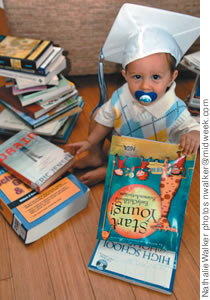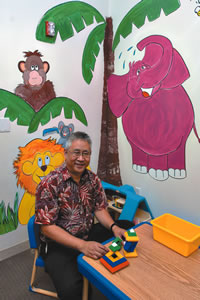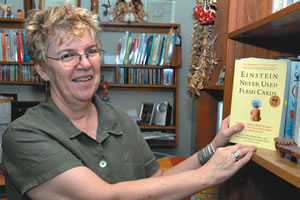How to make your baby smarter
Do Baby Einstein videos and the myriad of other trendy learning tools for babies really work to make babies smarter? We asked the experts. Interaction, it turns out, is the No. 1 key to making your baby smarter, whether it’s with someone or something. Dr. Steven Choy is a clinical psychologist who has been working with young children for 25 years, and his research has found that movement and music stimulate cognitive development.

|
I have to make a confession. I really don’t like to watch TV. I know, you’re thinking: But you work in television! That’s the point. If you work at the mall, do you really want to spend your off-time shopping? (Or maybe you do. Never mind.)
Which leads me to the super-trendy Baby Einstein videos that promise to turn your kid into a, well, Einstein. I have dozens, but never bother to show them to my baby. They collect dust in the cabinet. Am I foolishly overlooking some wonderful learning tool?
“No,” laughs parenting consultant Kathy Bentley of Kathy’s Parenting Solutions. “It’s probably better if you don’t. They’re OK, but you can’t expect to park your child in front of the television and let him learn on his own. You still have to interact with him.”
Interaction, it turns out, is the No. 1 key to making your baby smarter, whether it’s with someone or something. Dr. Steven Choy is a clinical psychologist who has been working with young children for 25 years, and his research has found that movement and music stimulate cognitive development.
“Anything that fosters creativity is good,” he says. “Creative toys are things that let your child build, design, draw, create. After all, creativity is the heart of intelligence.”
I called four other child experts as well, ranging from a Montessori teacher to a pediatrician. All of them echoed the same sentiment. Bentley succinctly sums it up: “You can buy the best stuff out there, but kids need interaction.”
That doesn’t just mean when you’re showing him a toy. It means paying attention to your child all the time you are with him. If you’re easily distracted by constant phone calls, checking e-mails or watching television, experts encourage you to change your habits.

|
Dr. Erin Nakano, Kaiser Permanente pediatrician, says, “It’s that attention and interaction that we have been talking about which is so crucial to a child’s development and learning. Of course, it’s all on a spectrum. A short phone call for business allowing a mother to spend the whole day with her child is very different than many long social calls which distract a mother from engaging with her child on a regular basis.”
Trendy Tots
Afew items keep popping up whenever I ask parents about what they bought for their child, with mixed results on the effectiveness.
Restaurateur Elizabeth Hata-Watanabe, who has a 4-year-old son and is expecting another son in December, names Baby Einstein among her favorites, along with a music album. “Pottery Barn’s CD In search of goodnight has 12 lullabies in 12 languages. The colors and sounds interested him so much, he became attached to some of them. It also gave me a break! By song three he was always knocked out. I like that it also gave him familiarity with different languages.” Hata-Watanabe is trilingual, and hopes to teach Kevin those languages.
KHNL/ K5’s weekend anchor Paul Drewes and wife Gina invested in the Your Baby Can Read DVDs when their son, now 4 years old, was just a baby. “It didn’t work for Noa. It required too much attention and he got bored. Then he would play with the box.”
Kaneohe resident David Hanby swears by flashcards. “I bought them for my son Tair when he was 5 months old. He could identify all the pictures in five weeks.”
Moanalua mother of three Valerie Lee recalls, “We bought our first child flashcards. I’m not sure how much it worked, because it required discipline and time to do it every day. Plus, he would rather eat it after a while.”
What do the experts think of ‘learn to read’ type DVDs and Einstein videos? “You can use any toy as a tool to interact with your baby. But you must be there to interact with them,” says Bentley.
She and Choy are not huge fans of the early reader-type products. Bentley elaborates, “It teaches your child to respond to a cue rather than read it. Reading is defined as looking at a word and identifying it. Children must be able to interact to really learn. I prefer parents read a book to their child, because the baby can look at their parent, see the colors, see the shapes, and hear the story. But most importantly the book is a focal point for interaction.”

|
Choy, a member of the Hawaii Psychological Association, continues, “They’re developing memory, not cognition. It sounds neat to say your child started reading early, but it’s actually developing associative functions, and in the long run, it’s much better to foster abstract learning, because that boosts intelligence. I would rather see a child learn to create something on his own.”
What about the parents who believe products like Your Baby Can Read helped their child become early readers, like my own editor, Don Chapman? “There were likely other factors, like genetics. The child was probably smart to begin with,” asserts Choy.
As for the Baby Einstein series, Choy says that also works on associative memory, not cognitive development. Bentley agrees. “Young children need movement. DVDs don’t encourage the children to move enough.”
Experts’ Recommendations
The experts unanimously conclude you don’t really even have to buy your child toys, but if you are going to, they all rank lowtech books as one of the best products to boost your child’s IQ.
“While many products are marketed to appeal to new parents who want to ensure their baby has every opportunity to succeed in life, there are simple brain boosters parent can provide. Talking with your child is perhaps the easiest and least expensive way to help brain development. Talk about what you’re doing, explain things, ask questions - play peek-a-boo and react positively to your baby’s sounds. Share smiles and let them know how happy you are to be with them,” says Elila Levinson, public policy coordinator at Good Beginnings Alliance.
Here are Levinson’s other suggestions to help support and enrich a baby’s experience as they gain skills through natural devel-
Page 1 of 2 pages for this story 1 2 >
E-mail this story | Print this page | Comments (0) | Archive | RSS
Most Recent Comment(s):








